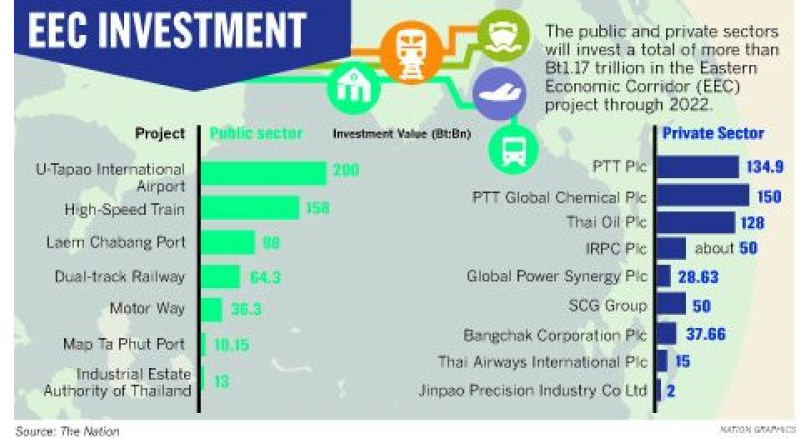Thailand: Investors ready to pour into EEC
Local, overseas corporates show interest as they await passing of corridor act by the legislature
THE Public and private sectors have committed to invest over Bt1.17 trillion in the Eastern Economic Corridor (EEC) from this year until 2022.
The planned investment in EECrelated infrastructure by the public sector alone reaches Bt569.75 billion (see graphic) while a number of Thai corporates as well overseas firms have also voiced an interest in expanding their investment in the corridor – once the EEC Act to provide more tax incentives to the private sector is in effect.
The EEC covers three provinces of the country’s eastern area – Chachoengsao, Chon Buri, and Rayong.
“We are interested in expanding our investment in EEC, especially construction of infrastructure projects because it is necessary to develop the EEC area to be the regional hub,” BTS Group Holdings Plc’s executive committee chairman, Keeree Kanjanapas, said recently.
He added that the company had already joined the bidding to develop both of the planned highspeed dualtrack railways to link EEC to other provinces. The company wants to help meet the challenge to boost the country’s economic growth for the longterm, he said.
PTT Group is also set make an aggressive investment to develop its petrochemical complex in the EEC and pursue innovative business to support its longterm business growth, said PTT Plc’s president and CEO Tevin Vongvanich.
Bangchak Corporation Plc and its subsidiaries have also set aside an investment budget of Bt37.66 billion for the 20182022 period to create their “BioComplex” in Chachoengsao province, said company president and CEO Chaiwat Kovavisarach.
“Chachoengsao is the prime location for biological products because the location is close to northeastern and eastern Thailand,” he said. “This is better for the logistics involved in transporting our raw material and products.”
Foreign investors are also interested in expanding investments in the EEC. For example, Taiwanbased Jinpao Precision Industry Co Ltd has set aside an investment budget of Bt2 billion to build a new plant producing structural sheet metal parts at Hemaraj Eastern Seaboard Industrial Estate 2 in Rayong province.
Swedish aerospace and defence firm Saab is also in discussions with Amata Corporation about possible cooperation in maintenance and development of a smart city, said Saab’s CEO, Hakan Buskhe. The talks follow Saab’s earlier survey about investment opportunities in maintenance, repair and operations in the EEC.
Chinese investment
Chinese conglomerate HNA Group is planning to link up with CT Bright, an investment unit of Charoen Pokphand Group (CP Group), to set up a fund for investment in the Eastern Economic Corridor (EEC). HNA Group, based in Hainan province and founded in 2000, is involved in aviation, real estate, financial services, tourism, logistics, and other industries. It is a partial owner of Grand China Air, and the Hilton Hotels group.
According to Hong Kongbased South China Morning Post, HNA Innovation Finance and CT Bright will contribute 20 per cent each to the fund – which may reach US$5 billion (Bt 157.3 billion) over the next three to five years – to invest in the $43billion EEC project. CP Group, among others, are conducting a feasibility study into a highspeed train linking the revitalised Utapao international airport in Rayong province to Bangkok. The study could lead to investment.
Kanit Sangsubhan, secretarygeneral of the Eastern Economic Corridor Office (EECO), said that the Eastern Economic Corridor will serve as a national gateway enabling 10 target industries to realise the Thailand 4.0 vision.
Those 10 industries are nextgeneration cars, smart electronics, affluent medical and wellness tourism, agriculture and biotechnology, food, robotics for industry, logistics and aviation, biofuels and biochemicals, digital, and medical services. This year’s application tarฌget for investment promotion privileges in the EEC has been raised to Bt250 billion from the previous estimate of Bt200 billion, according to Kanit.
He added that the EECO has set a target to triple the current 20 million foreign and Thai tourists visiting the three provinces over the next eight years.
About 18 areas with 26 billion rai (4.16 billion hectares) will be proposed as industrial promotional zones with a focus on the targeted industries. A 3,000 rai area is planned as an industrial promotional zone for hightech industries with Chinese operators.
The EEC is now coordinating with the private sector to link foreign and Thail investors who want to establish their manufacturing bases in the EEC.
Deputy Prime Minister Somkid Jatusripitak last week said that the EEC Act will soon be in effect and will soon move through the National Legislative Assembly.
The Act will provide more incentive for both local and foreign investors to expand their investment in the area, including a personal income tax reduction to 17 per cent.
Companies and juristic entities will be exempted from corporate income tax for expenses paid for investment, changes, expansion or improvement of property, but not for repairs of a property’s current conditions.
Source: http://www.nationmultimedia.com/detail/Economy/30337942


 Thailand
Thailand




